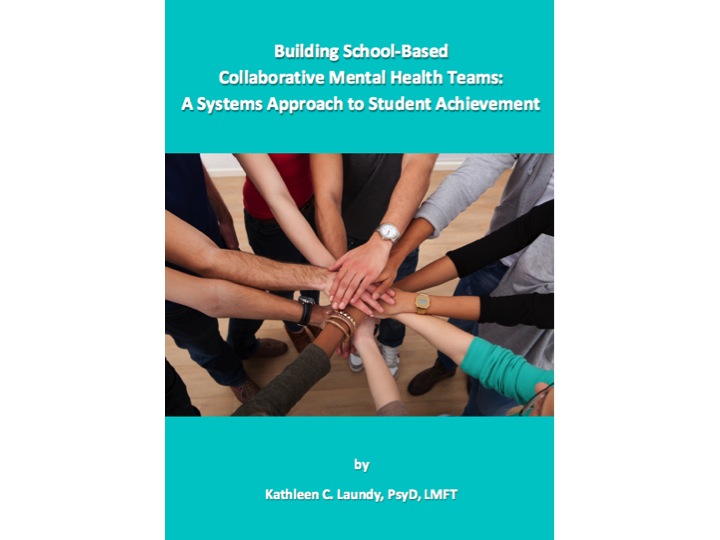Description
Building School-Based Collaborative Mental Health Teams: A Systems Approach to Student Achievement
Schools are a natural setting for providing mental health services to children. This is where they spend most of their time, learn to develop peer relationships, and cultivate life skills. From a primary prevention perspective it is the perfect place to teach children and adolescents appropriate coping and resiliency skills that will positively impact their lives going forward. From a secondary prevention perspective, early identification and referral for intervention can help children who are veering off path get back on track.
In this volume, Dr. Kathleen Laundy draws upon her years of experience as an educator, psychologist and marriage and family therapist to describe ways in which professionals can effectively collaborate as teams in the best interests of children. It is essential reading for any mental health professional who wants to apply their skills in the most natural of settings for children, the schools they attend on a daily basis.
Read the introduction here (click arrow to expand)[expand]
The aim of this book is to provide information about the systemic, value-added services of family-centered, collaborative school mental health teams to educational achievement. The goal of the book is to help readers appreciate the shift from individualized approaches to student learning to a more cybernetic view of educational achievement in the past 50 years. Bateson (1972), the noted anthropologist-biologist who is considered a leader in the adaptation of systems theory to the behavioral and social sciences, profoundly influenced our thinking about how multiple genetic and environmental variables affect human behavior. This text is about how those variables all affect student health and academic functioning.
Seligman and Darling (2007) note that strengthening families helps boost resiliency in children, especially those with special health and learning needs. All professionals who work with children know that family support is necessary for children to thrive and achieve. This book is also about supporting family-friendly schools to promote academic achievement.
Although state certification for school marriage and family therapists (MFTs)1 provided the original impetus for the book, Building School-Based Collaborative Mental Health Teams can serve as a useful handbook for all allied health care colleagues, teachers, administrators, and family members who wish to learn about the ingredients needed to engage in collaborative school practice.
Colleagues from other mental health disciplines will see their own experience in case examples that are sprinkled throughout the book. Our skill set in mental health contains what I call necessary redundancies, which refer to common clinical skills that all six of our licensed mental health disciplines (counseling, MFT, nursing, psychiatry, psychology, and social work) are trained to provide. Readers of this text are invited to add any necessary redundancies they use to the growing multidisciplinary synergy of service in schools, as more systemic models are being developed to boost student achievement. I encourage you to read this text with a critical eye for where your skills may fit collaboratively with the school teams that interest you.
There are innovative collaborative models of health care provision in the field of family therapy that blend well with school-based practice. Adaptation of those models to the milieu of education can offer synergistic support to existing programs and services in schools for children with mental health and other special needs. Allied health care professionals must know how schools function to best integrate tools from their clinical training with the system of education. In turn, schools, allied educational colleagues, and families can all benefit from learning about the value-added services of mental health services in education. Professionals in the fields of health and education have similar goals of promoting full functioning for children and families. Their focus may be different, but their goals are complementary. Educators seek to help children learn and achieve, and healthy children are better prepared to achieve. Health care providers aim for children to lead healthy lives, which includes full access to education.
Because the focus of what we do differs, mental health clinicians wishing to provide multidisciplinary services in schools first need to become respectful “guests” in education systems to join effectively with a setting where education is the primary goal. The aim of Building School-Based Collaborative Mental Health Teams is to equip health colleagues, school professionals, and families with the information necessary to collaboratively promote academic achievement and resiliency in our youth. For some, the book will be a historic refresher. For others, it will be an introduction to the theoretical transition from individualized notions of student success to a broader systemic orientation to school culture and its layers of influence on child development. For still others, it will offer some practical examples that will be useful for your school-based practice. My hope is that there are elements of the text that will be useful for all readers. [/expand]
About Dr. Laundy
 Dr. Kathleen Laundy is a licensed psychologist, family therapist and social worker who has worked for over 40 years with children and families who experience chronic illness. In her private practice she consults with schools and other systems related to children and families.
Dr. Kathleen Laundy is a licensed psychologist, family therapist and social worker who has worked for over 40 years with children and families who experience chronic illness. In her private practice she consults with schools and other systems related to children and families.
She is an American Association for Marriage and Family Therapy Approved Supervisor and a clinical professor at the Counseling and Family Therapy program of Central Connecticut State University where she prepares graduate mental health clinicians for school-based practice. She is Past President of the Connecticut Association for Marriage and Family Therapy. She is a frequent speaker at educational and mental health conferences.
Are you considering this book for a class you are teaching?
Request a review copy. Download the request form and email it as an attachment to jeffzimmermanphdATthepracticeinstitute.com.





